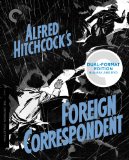| Reviews & Columns |
|
Reviews DVD TV on DVD Blu-ray 4K UHD International DVDs In Theaters Reviews by Studio Video Games Features Collector Series DVDs Easter Egg Database Interviews DVD Talk Radio Feature Articles Columns Anime Talk DVD Savant Horror DVDs The M.O.D. Squad Art House HD Talk Silent DVD
|
DVD Talk Forum |
|
|
| Resources |
|
DVD Price Search Customer Service #'s RCE Info Links |
|
Columns
|
|
|
Foreign Correspondent
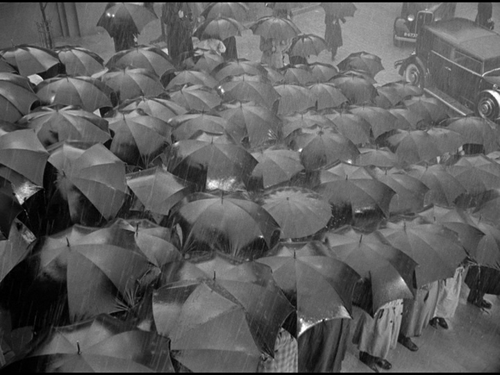
Please Note: The screen shots used here are taken from the DVD portion of Foreign Correspondent.
The Movie:
"To those intrepid ones who went across the seas to be the eyes and ears of America . . . . To those forthright ones who early saw the clouds of war while many of us at home were seeing rainbows . . . . To those clear-headed ones who now stand like recording angels among the dead and dying . . . . To the Foreign Correspondents -- this motion picture is dedicated."
With a twisty story of wartime intrigue set across America and Europe, 1940's Foreign Correspondent is Alfred Hitchcock getting back into his element. Coming off the acclaimed yet labor-intensive Rebecca, Hitchcock's second American production must have come as a breath of breezy, unpretentious air. Although it tends to get passed over by Hitchcock fans, Criterion's three-disc dual-format gives this corker a thorough reappraisal, its pulpy thrills slicked-up, beautifully restored and packaged like a vintage Hardy Boys volume.
With Foreign Correspondent, Hitchcock transitioned from the micromanaging producer David O. Selznick (Gone with the Wind, Rebecca) to the more simpatico Walter Wanger, working under the independent United Artists studio. Although Wanger has a more hands-off approach, the final film does show evidence of Hitchcock attempting to do a tidy, adventure-filled war story despite Wanger's continued meddling with the script. The producer's attempts at making the story more topical even after the cameras started rolling (not to mention the tacked-on propaganda-fueled ending), give it a more dated feel than what was needed - it's to Hitchcock's credit that he makes it work. The convoluted plotting shows evidence that it was tinkered with by several scribes (including its eventual co-star, humorist Robert Benchley). Another setback came when Hitchcock's original choices for the starring roles, Gary Cooper and Barbara Stanwyck, had to pass due to scheduling conflicts. While Joel McCrea and Laraine Day did a capable job with their roles, their blandness puts something of a damper on the proceedings (it's heartily made up for with Hitch's usual cast of vivid supporting players, however).
For all its popcorn escapism, Wanger and Hitchcock intended Foreign Correspondent as a cautious statement on America's isolationist attitude toward the turmoil in Europe. It's all there in the transformation of Joel McCrea's protagonist Johnny Jones, a jocular, devil-may-care news reporter who becomes an unexpected choice to cover the rise of fascism in Europe. Seeking an unvarnished viewpoint on the unrest, Johnny's editor, Mr. Powers (Harry Davenport), gives him the alias of Huntley Haverstock and assigns him to the paper's London office. After meeting with the frazzled liaison Stebbins (Benchley), Johnny a.k.a. Huntley gets the scoop at a peace conference where the guest of honor is Van Meer (Albert Basserman), a diplomat involved in a high-profile treaty between the Dutch and the Belgians. Huntley gets to have a brief one-on-one with Van Meer before the conference, but he's assuredly more taken in by Carol (Day), the fetching daughter of peace movement leader Stephen Fisher (Herbert Marshall). Huntley catches up with Van Meer again for another conference in rain-drenched Amsterdam, although Van Meer appears puzzled when greeted by the reporter. When Van Meer is assassinated by a man posing as a photographer, the film shifts into high gear with Huntley pursuing the killer in an auto with Carol and her oddly-named reporter friend, Scott ffolliott (George Sanders). Tracking the man to an old windmill, Huntley is surprised with what he finds. As Huntley digs deeper into this massive conspiracy, he finds that the assassination and kidnapping was engineered by a shadowy group which happens to bear some resemblance to Nazis. Huntley's alias becomes more difficult to hide as he falls in love with Carol, especially since her father is revealed to be one of the main conspirators.
Foreign Correspondent's heady mix of wartime thrills and moony romance holds up remarkably well, which is all the more surprising given that it sprung from the rocky period when Hitch was still getting his footing in Hollywood. Hitchcock's tight, economical filming techniques lend themselves well to this sort of material. Of course, that assassination scene is the main thing people remember this for, with McCrea pursuing the killer through a sea of umbrellas, then across a precisely choreographed morass of bicyclists, vehicles and pedestrians. This and many other sequences flaunt Hitchcock's love of flamboyant quick-cuts (shout-out to Eisenstein!), and his fascination with acts of random, shocking violence (par for the course in his British flicks, weirdly transgressive in the Hollywood ones). Seeing this again, I'm pleasantly surprised at how many other effectively suspenseful scenes it contains, including McCrea hiding out in the windmill, McCrea navigating a steep hotel balcony in the dark - and one of the greatest plane crash scenes ever committed to celluloid. Without going into great detail, the sequence is as shocking to see the umpteenth time around as the first. Here and elsewhere, production designer William Cameron Menzies (Gone with the Wind), photographer Rudolph Maté and a host of other talented behind-the-scenes craftsmen do wonders with models, back projection, and on-film effects. Quaint as it may seem today, their work makes this cautionary tale all the more effective.
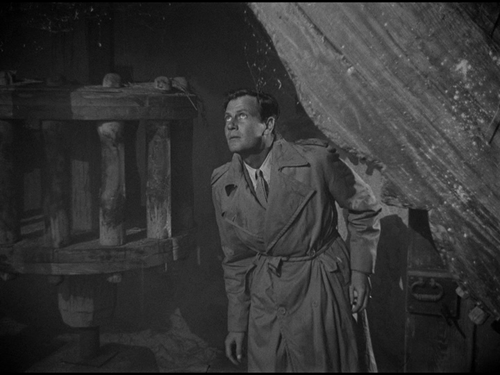
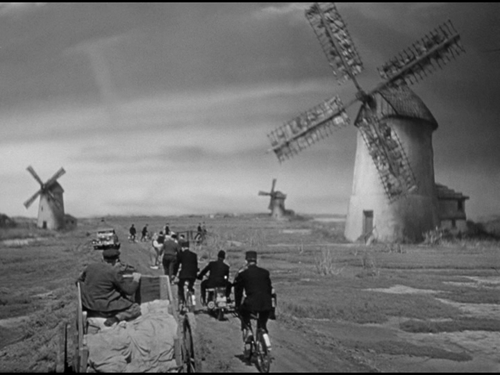
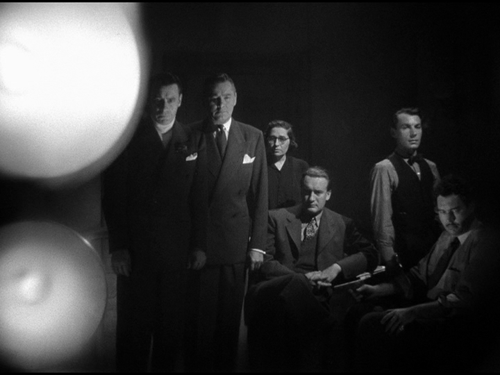
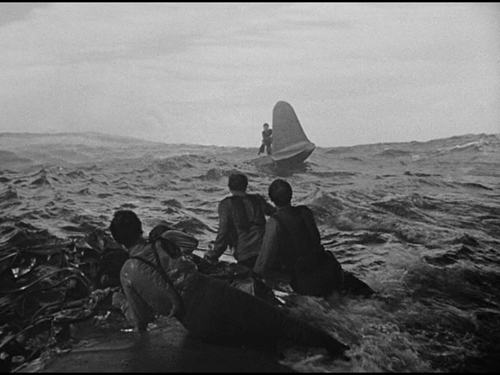
The Blu Ray:
Criterion has included Foreign Correspondent as part of their dual-format releases, combining the Blu Ray and DVD editions in a single package. The slip cased paperboard opens up to two plastic trays containing the Blu Ray and two DVDs (film and supplements on separate discs) in a layered configuration. Typical of Criterion's high standards, the design effectively uses photographs and two-color illustrations done in a style familiar to anyone who's flipped through a 1940s magazine.
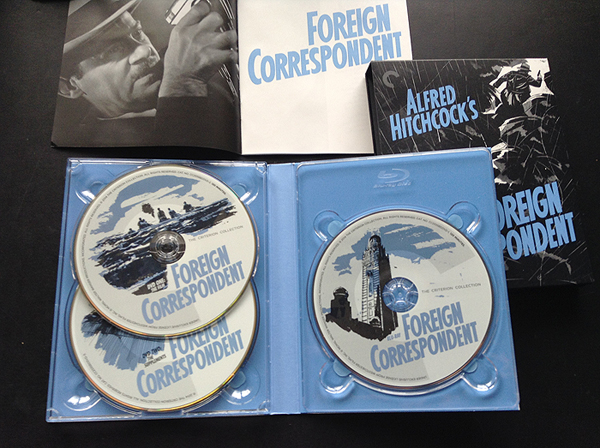
Video
While Warner Home Video's 2004 DVD edition of Foreign Correspondent wasn't on hand to compare, the newly restored 1.37:1 image on the Blu Ray is as polished and lovely as a 1940s-era film can get. Except for a few high-contrast scenes shot outdoors in natural light, the picture looks smooth, crisp, and in some cases absolutely breathtaking (McCrea inside the windmill). The digital restoration eliminated debris, scratches and flutter, all the while maintaining the warm, grainy texture of the original 35mm film.
Audio
The film's original monoaural soundtrack was also given a clean-sounding restoration for this release, which manually eliminated instances of "clicks, thumps, hiss and hum" (as the booklet states) from the source print. Surprisingly, no subtitle options are provided.
Extras
Criterion has provided their usual array of nicely-produced new extras, along with some intriguing archival material:
- The Hollywood Propaganda and World War II featurette (25:19) features film critic Mark Harris dryly discussing the circumstances behind Foreign Correspondent and how it reflected Hollywood's initial reluctance to address the turmoil in Europe.
- In the fascinating Visual Effects in Foreign Correspondent featurette (18:56), expert Craig Barron goes into great detail on how the film's set pieces - including the plane crash scene - were constructed using then state-of-the-art techniques.
- Dick Cavett Interviews Hitchcock (1:02:06) presents a vintage 1972 episode of Cavett's talk show in which a droll Hitchcock, then promoting Frenzy, charms the audience with anecdotes on his childhood, Hollywood, practical jokes, and the production of various films (including a bit on Foreign Correspondent). The footage has the film clips edited out, and an introduction from Cavett taken off the 2006 release The Dick Cavett Show: Hollywood Greats.
- The disc also includes Have You Heard?, an unusual Life magazine article from 1942, as a click-through photo and text gallery. Via images cast and directed by Hitchcock (including, of course, a cameo from the director), the feature cautions wartime audiences on the dangers of gossip.
- Plus! A radio adaptation, greatly condensed into a half-hour. Joseph Cotten stars as Johnny Jones in this 1946 episode of the anthology series Academy Award.
- A nifty 18-page booklet includes an essay by author/historian James Naremore, chapters, cast and crew listings, and notes on the transfer.
- The film's original theatrical trailer, which presents the au courant story in newsreel style, rounds out the extras.
Final Thoughts
While 1940's solid, absorbing wartime thriller Foreign Correspondent can't escape feeling like a B-list title in Alfred Hitchcock's filmography, its slick and tidy suspense demonstrates that Hitch's B-list efforts are an improvement over the A-list stuff of most other directors. Criterion's fantastic-looking, feature-heavy reissue gives this overlooked gem the polish it deserves. DVD Talk Collectors Series.
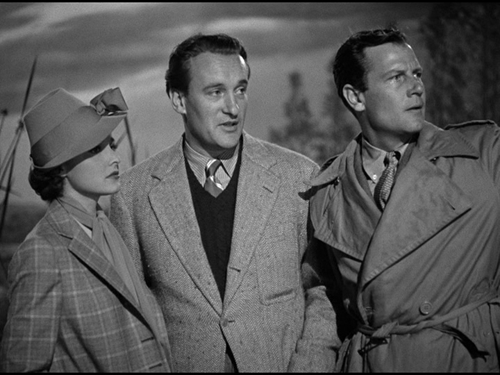
Matt Hinrichs is a designer, artist, film critic and jack-of-all-trades in Phoenix, Arizona. Since 2000, he has been blogging at Scrubbles.net. 4 Color Cowboy is his repository of Western-kitsch imagery, while other films he's experienced are logged at Letterboxd. He also welcomes friends on Twitter @4colorcowboy.
|
| Popular Reviews |
| Sponsored Links |
|
|
| Sponsored Links |
|
|
| Release List | Reviews | Shop | Newsletter | Forum | DVD Giveaways | Blu-Ray | Advertise |
|
Copyright 2024 DVDTalk.com All Rights Reserved. Legal Info, Privacy Policy, Terms of Use,
Manage Preferences,
Your Privacy Choices | |||||||









